Impact of Employment Law and Corporate Governance on Business Operations
VerifiedAdded on 2023/06/05
|10
|3205
|439
AI Summary
This essay discusses the impact of employment law and corporate governance on business operations. It defines employment law, its importance, and its impact on business. It also explains corporate governance, its principles, and its benefits for businesses.
Contribute Materials
Your contribution can guide someone’s learning journey. Share your
documents today.

Written essay.
Secure Best Marks with AI Grader
Need help grading? Try our AI Grader for instant feedback on your assignments.
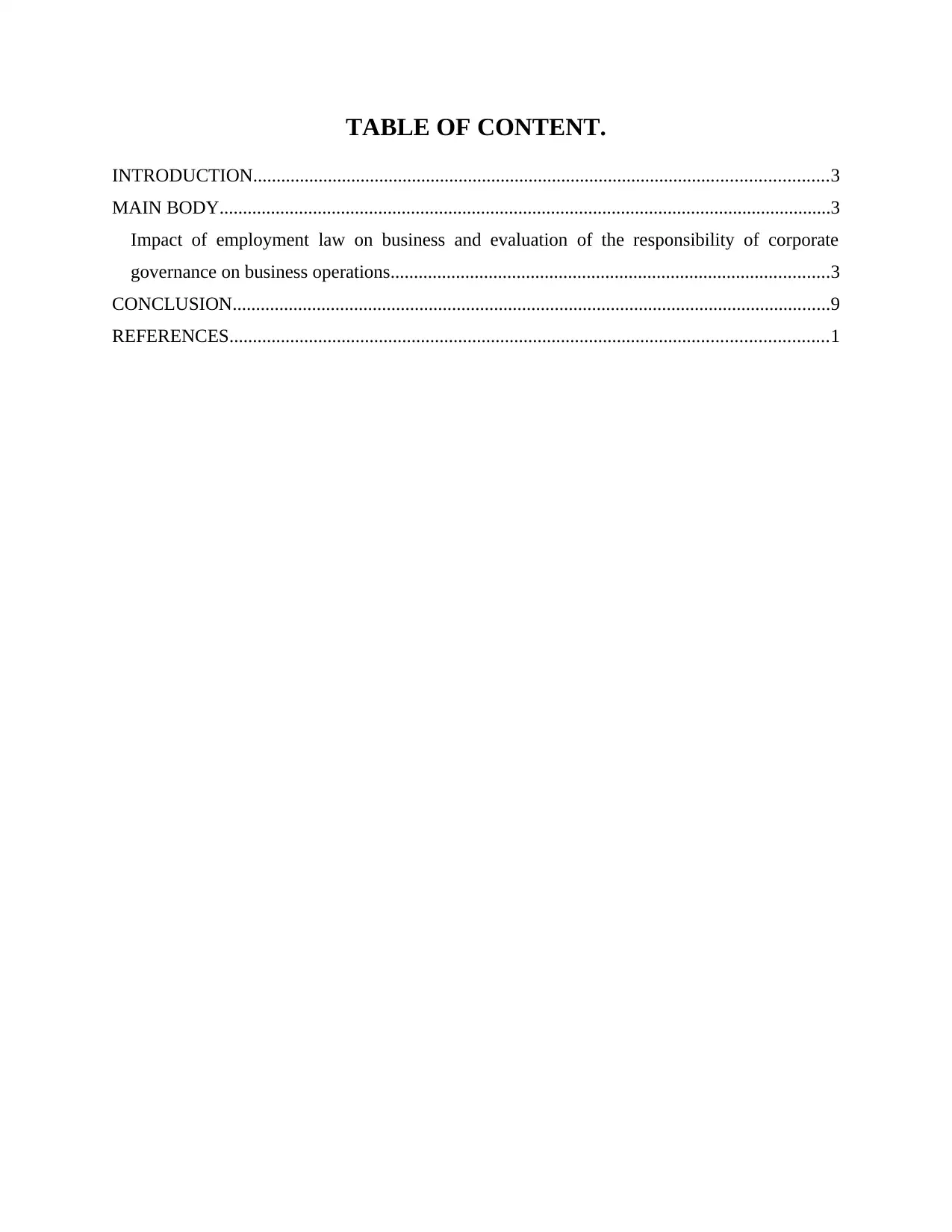
TABLE OF CONTENT.
INTRODUCTION...........................................................................................................................3
MAIN BODY...................................................................................................................................3
Impact of employment law on business and evaluation of the responsibility of corporate
governance on business operations..............................................................................................3
CONCLUSION................................................................................................................................9
REFERENCES................................................................................................................................1
INTRODUCTION...........................................................................................................................3
MAIN BODY...................................................................................................................................3
Impact of employment law on business and evaluation of the responsibility of corporate
governance on business operations..............................................................................................3
CONCLUSION................................................................................................................................9
REFERENCES................................................................................................................................1
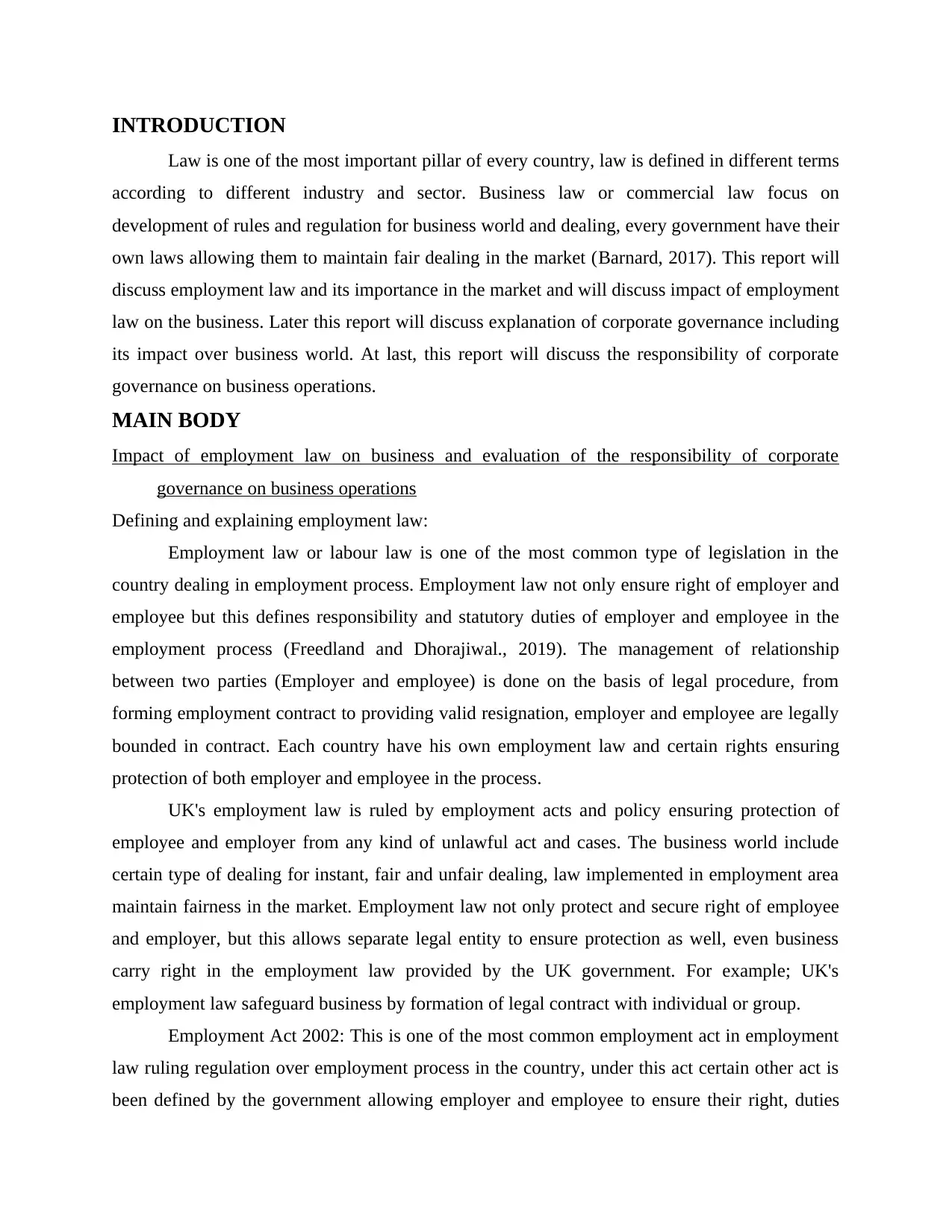
INTRODUCTION
Law is one of the most important pillar of every country, law is defined in different terms
according to different industry and sector. Business law or commercial law focus on
development of rules and regulation for business world and dealing, every government have their
own laws allowing them to maintain fair dealing in the market (Barnard, 2017). This report will
discuss employment law and its importance in the market and will discuss impact of employment
law on the business. Later this report will discuss explanation of corporate governance including
its impact over business world. At last, this report will discuss the responsibility of corporate
governance on business operations.
MAIN BODY
Impact of employment law on business and evaluation of the responsibility of corporate
governance on business operations
Defining and explaining employment law:
Employment law or labour law is one of the most common type of legislation in the
country dealing in employment process. Employment law not only ensure right of employer and
employee but this defines responsibility and statutory duties of employer and employee in the
employment process (Freedland and Dhorajiwal., 2019). The management of relationship
between two parties (Employer and employee) is done on the basis of legal procedure, from
forming employment contract to providing valid resignation, employer and employee are legally
bounded in contract. Each country have his own employment law and certain rights ensuring
protection of both employer and employee in the process.
UK's employment law is ruled by employment acts and policy ensuring protection of
employee and employer from any kind of unlawful act and cases. The business world include
certain type of dealing for instant, fair and unfair dealing, law implemented in employment area
maintain fairness in the market. Employment law not only protect and secure right of employee
and employer, but this allows separate legal entity to ensure protection as well, even business
carry right in the employment law provided by the UK government. For example; UK's
employment law safeguard business by formation of legal contract with individual or group.
Employment Act 2002: This is one of the most common employment act in employment
law ruling regulation over employment process in the country, under this act certain other act is
been defined by the government allowing employer and employee to ensure their right, duties
Law is one of the most important pillar of every country, law is defined in different terms
according to different industry and sector. Business law or commercial law focus on
development of rules and regulation for business world and dealing, every government have their
own laws allowing them to maintain fair dealing in the market (Barnard, 2017). This report will
discuss employment law and its importance in the market and will discuss impact of employment
law on the business. Later this report will discuss explanation of corporate governance including
its impact over business world. At last, this report will discuss the responsibility of corporate
governance on business operations.
MAIN BODY
Impact of employment law on business and evaluation of the responsibility of corporate
governance on business operations
Defining and explaining employment law:
Employment law or labour law is one of the most common type of legislation in the
country dealing in employment process. Employment law not only ensure right of employer and
employee but this defines responsibility and statutory duties of employer and employee in the
employment process (Freedland and Dhorajiwal., 2019). The management of relationship
between two parties (Employer and employee) is done on the basis of legal procedure, from
forming employment contract to providing valid resignation, employer and employee are legally
bounded in contract. Each country have his own employment law and certain rights ensuring
protection of both employer and employee in the process.
UK's employment law is ruled by employment acts and policy ensuring protection of
employee and employer from any kind of unlawful act and cases. The business world include
certain type of dealing for instant, fair and unfair dealing, law implemented in employment area
maintain fairness in the market. Employment law not only protect and secure right of employee
and employer, but this allows separate legal entity to ensure protection as well, even business
carry right in the employment law provided by the UK government. For example; UK's
employment law safeguard business by formation of legal contract with individual or group.
Employment Act 2002: This is one of the most common employment act in employment
law ruling regulation over employment process in the country, under this act certain other act is
been defined by the government allowing employer and employee to ensure their right, duties
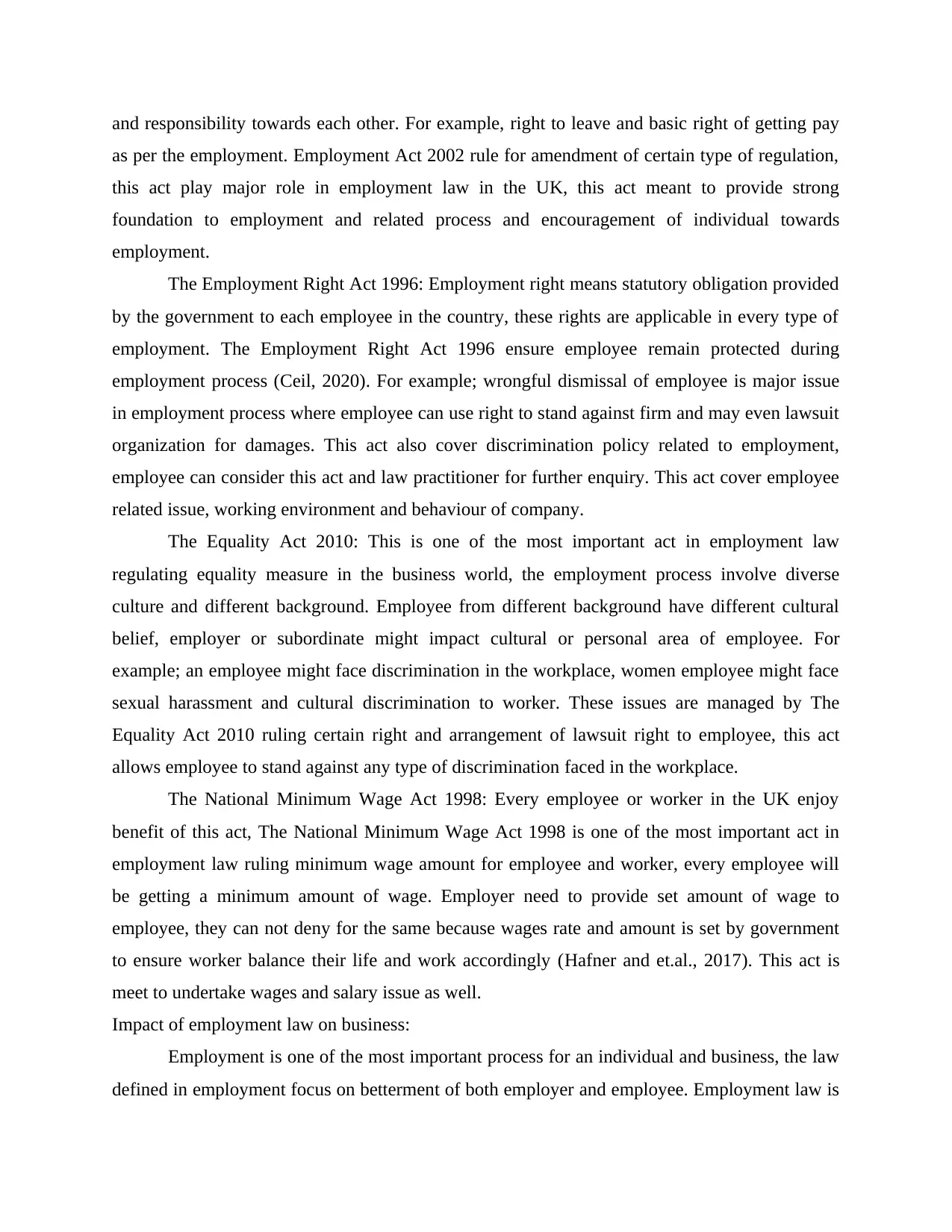
and responsibility towards each other. For example, right to leave and basic right of getting pay
as per the employment. Employment Act 2002 rule for amendment of certain type of regulation,
this act play major role in employment law in the UK, this act meant to provide strong
foundation to employment and related process and encouragement of individual towards
employment.
The Employment Right Act 1996: Employment right means statutory obligation provided
by the government to each employee in the country, these rights are applicable in every type of
employment. The Employment Right Act 1996 ensure employee remain protected during
employment process (Ceil, 2020). For example; wrongful dismissal of employee is major issue
in employment process where employee can use right to stand against firm and may even lawsuit
organization for damages. This act also cover discrimination policy related to employment,
employee can consider this act and law practitioner for further enquiry. This act cover employee
related issue, working environment and behaviour of company.
The Equality Act 2010: This is one of the most important act in employment law
regulating equality measure in the business world, the employment process involve diverse
culture and different background. Employee from different background have different cultural
belief, employer or subordinate might impact cultural or personal area of employee. For
example; an employee might face discrimination in the workplace, women employee might face
sexual harassment and cultural discrimination to worker. These issues are managed by The
Equality Act 2010 ruling certain right and arrangement of lawsuit right to employee, this act
allows employee to stand against any type of discrimination faced in the workplace.
The National Minimum Wage Act 1998: Every employee or worker in the UK enjoy
benefit of this act, The National Minimum Wage Act 1998 is one of the most important act in
employment law ruling minimum wage amount for employee and worker, every employee will
be getting a minimum amount of wage. Employer need to provide set amount of wage to
employee, they can not deny for the same because wages rate and amount is set by government
to ensure worker balance their life and work accordingly (Hafner and et.al., 2017). This act is
meet to undertake wages and salary issue as well.
Impact of employment law on business:
Employment is one of the most important process for an individual and business, the law
defined in employment focus on betterment of both employer and employee. Employment law is
as per the employment. Employment Act 2002 rule for amendment of certain type of regulation,
this act play major role in employment law in the UK, this act meant to provide strong
foundation to employment and related process and encouragement of individual towards
employment.
The Employment Right Act 1996: Employment right means statutory obligation provided
by the government to each employee in the country, these rights are applicable in every type of
employment. The Employment Right Act 1996 ensure employee remain protected during
employment process (Ceil, 2020). For example; wrongful dismissal of employee is major issue
in employment process where employee can use right to stand against firm and may even lawsuit
organization for damages. This act also cover discrimination policy related to employment,
employee can consider this act and law practitioner for further enquiry. This act cover employee
related issue, working environment and behaviour of company.
The Equality Act 2010: This is one of the most important act in employment law
regulating equality measure in the business world, the employment process involve diverse
culture and different background. Employee from different background have different cultural
belief, employer or subordinate might impact cultural or personal area of employee. For
example; an employee might face discrimination in the workplace, women employee might face
sexual harassment and cultural discrimination to worker. These issues are managed by The
Equality Act 2010 ruling certain right and arrangement of lawsuit right to employee, this act
allows employee to stand against any type of discrimination faced in the workplace.
The National Minimum Wage Act 1998: Every employee or worker in the UK enjoy
benefit of this act, The National Minimum Wage Act 1998 is one of the most important act in
employment law ruling minimum wage amount for employee and worker, every employee will
be getting a minimum amount of wage. Employer need to provide set amount of wage to
employee, they can not deny for the same because wages rate and amount is set by government
to ensure worker balance their life and work accordingly (Hafner and et.al., 2017). This act is
meet to undertake wages and salary issue as well.
Impact of employment law on business:
Employment is one of the most important process for an individual and business, the law
defined in employment focus on betterment of both employer and employee. Employment law is
Secure Best Marks with AI Grader
Need help grading? Try our AI Grader for instant feedback on your assignments.
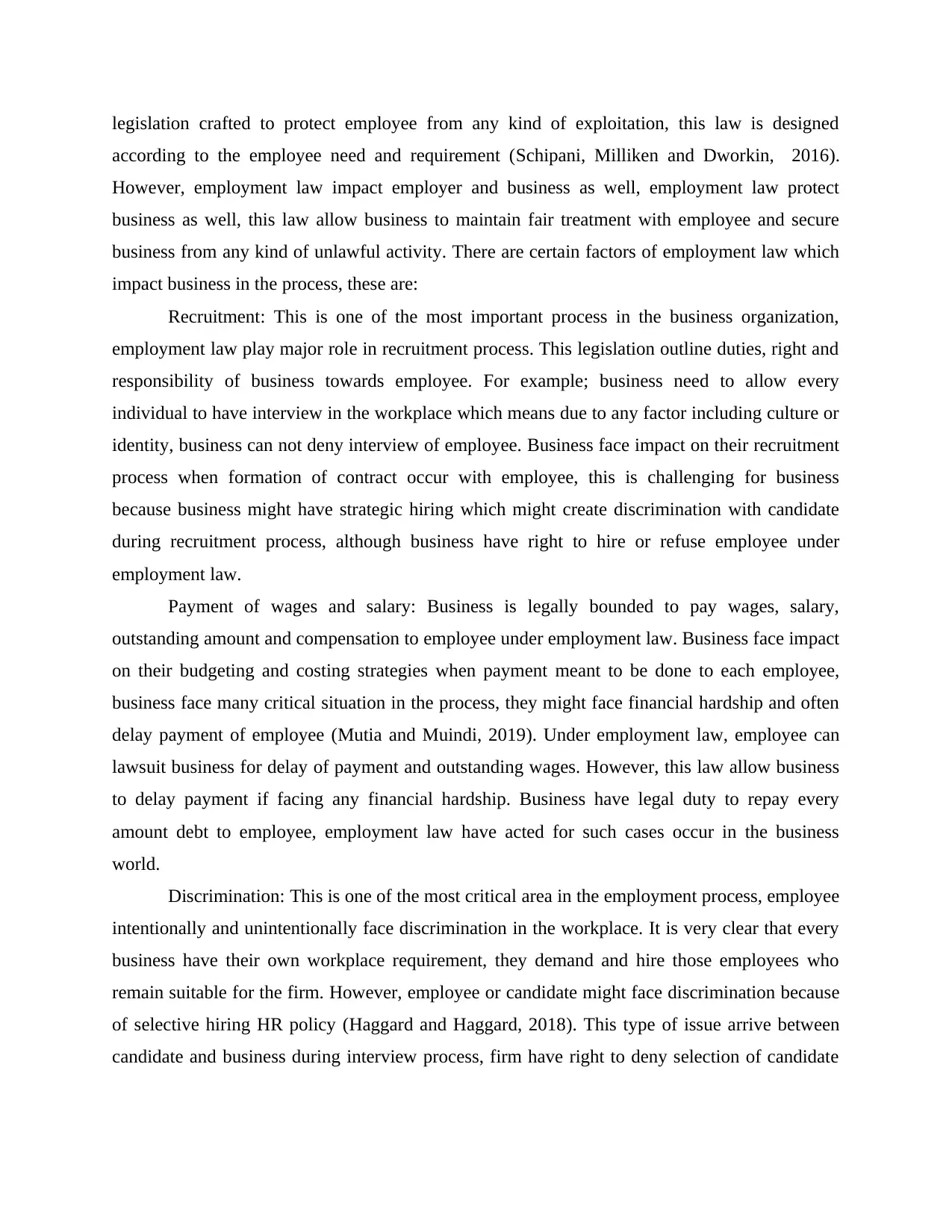
legislation crafted to protect employee from any kind of exploitation, this law is designed
according to the employee need and requirement (Schipani, Milliken and Dworkin, 2016).
However, employment law impact employer and business as well, employment law protect
business as well, this law allow business to maintain fair treatment with employee and secure
business from any kind of unlawful activity. There are certain factors of employment law which
impact business in the process, these are:
Recruitment: This is one of the most important process in the business organization,
employment law play major role in recruitment process. This legislation outline duties, right and
responsibility of business towards employee. For example; business need to allow every
individual to have interview in the workplace which means due to any factor including culture or
identity, business can not deny interview of employee. Business face impact on their recruitment
process when formation of contract occur with employee, this is challenging for business
because business might have strategic hiring which might create discrimination with candidate
during recruitment process, although business have right to hire or refuse employee under
employment law.
Payment of wages and salary: Business is legally bounded to pay wages, salary,
outstanding amount and compensation to employee under employment law. Business face impact
on their budgeting and costing strategies when payment meant to be done to each employee,
business face many critical situation in the process, they might face financial hardship and often
delay payment of employee (Mutia and Muindi, 2019). Under employment law, employee can
lawsuit business for delay of payment and outstanding wages. However, this law allow business
to delay payment if facing any financial hardship. Business have legal duty to repay every
amount debt to employee, employment law have acted for such cases occur in the business
world.
Discrimination: This is one of the most critical area in the employment process, employee
intentionally and unintentionally face discrimination in the workplace. It is very clear that every
business have their own workplace requirement, they demand and hire those employees who
remain suitable for the firm. However, employee or candidate might face discrimination because
of selective hiring HR policy (Haggard and Haggard, 2018). This type of issue arrive between
candidate and business during interview process, firm have right to deny selection of candidate
according to the employee need and requirement (Schipani, Milliken and Dworkin, 2016).
However, employment law impact employer and business as well, employment law protect
business as well, this law allow business to maintain fair treatment with employee and secure
business from any kind of unlawful activity. There are certain factors of employment law which
impact business in the process, these are:
Recruitment: This is one of the most important process in the business organization,
employment law play major role in recruitment process. This legislation outline duties, right and
responsibility of business towards employee. For example; business need to allow every
individual to have interview in the workplace which means due to any factor including culture or
identity, business can not deny interview of employee. Business face impact on their recruitment
process when formation of contract occur with employee, this is challenging for business
because business might have strategic hiring which might create discrimination with candidate
during recruitment process, although business have right to hire or refuse employee under
employment law.
Payment of wages and salary: Business is legally bounded to pay wages, salary,
outstanding amount and compensation to employee under employment law. Business face impact
on their budgeting and costing strategies when payment meant to be done to each employee,
business face many critical situation in the process, they might face financial hardship and often
delay payment of employee (Mutia and Muindi, 2019). Under employment law, employee can
lawsuit business for delay of payment and outstanding wages. However, this law allow business
to delay payment if facing any financial hardship. Business have legal duty to repay every
amount debt to employee, employment law have acted for such cases occur in the business
world.
Discrimination: This is one of the most critical area in the employment process, employee
intentionally and unintentionally face discrimination in the workplace. It is very clear that every
business have their own workplace requirement, they demand and hire those employees who
remain suitable for the firm. However, employee or candidate might face discrimination because
of selective hiring HR policy (Haggard and Haggard, 2018). This type of issue arrive between
candidate and business during interview process, firm have right to deny selection of candidate
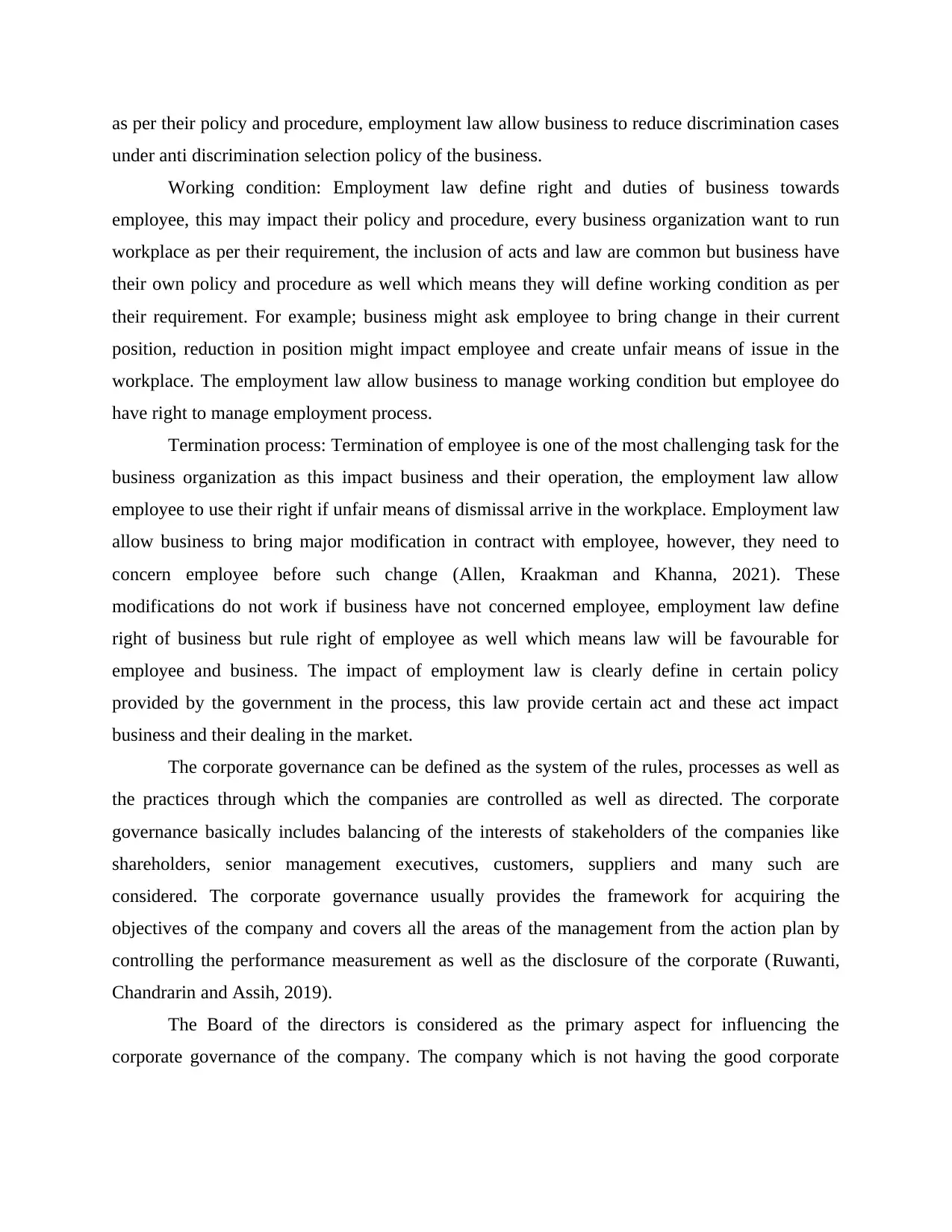
as per their policy and procedure, employment law allow business to reduce discrimination cases
under anti discrimination selection policy of the business.
Working condition: Employment law define right and duties of business towards
employee, this may impact their policy and procedure, every business organization want to run
workplace as per their requirement, the inclusion of acts and law are common but business have
their own policy and procedure as well which means they will define working condition as per
their requirement. For example; business might ask employee to bring change in their current
position, reduction in position might impact employee and create unfair means of issue in the
workplace. The employment law allow business to manage working condition but employee do
have right to manage employment process.
Termination process: Termination of employee is one of the most challenging task for the
business organization as this impact business and their operation, the employment law allow
employee to use their right if unfair means of dismissal arrive in the workplace. Employment law
allow business to bring major modification in contract with employee, however, they need to
concern employee before such change (Allen, Kraakman and Khanna, 2021). These
modifications do not work if business have not concerned employee, employment law define
right of business but rule right of employee as well which means law will be favourable for
employee and business. The impact of employment law is clearly define in certain policy
provided by the government in the process, this law provide certain act and these act impact
business and their dealing in the market.
The corporate governance can be defined as the system of the rules, processes as well as
the practices through which the companies are controlled as well as directed. The corporate
governance basically includes balancing of the interests of stakeholders of the companies like
shareholders, senior management executives, customers, suppliers and many such are
considered. The corporate governance usually provides the framework for acquiring the
objectives of the company and covers all the areas of the management from the action plan by
controlling the performance measurement as well as the disclosure of the corporate (Ruwanti,
Chandrarin and Assih, 2019).
The Board of the directors is considered as the primary aspect for influencing the
corporate governance of the company. The company which is not having the good corporate
under anti discrimination selection policy of the business.
Working condition: Employment law define right and duties of business towards
employee, this may impact their policy and procedure, every business organization want to run
workplace as per their requirement, the inclusion of acts and law are common but business have
their own policy and procedure as well which means they will define working condition as per
their requirement. For example; business might ask employee to bring change in their current
position, reduction in position might impact employee and create unfair means of issue in the
workplace. The employment law allow business to manage working condition but employee do
have right to manage employment process.
Termination process: Termination of employee is one of the most challenging task for the
business organization as this impact business and their operation, the employment law allow
employee to use their right if unfair means of dismissal arrive in the workplace. Employment law
allow business to bring major modification in contract with employee, however, they need to
concern employee before such change (Allen, Kraakman and Khanna, 2021). These
modifications do not work if business have not concerned employee, employment law define
right of business but rule right of employee as well which means law will be favourable for
employee and business. The impact of employment law is clearly define in certain policy
provided by the government in the process, this law provide certain act and these act impact
business and their dealing in the market.
The corporate governance can be defined as the system of the rules, processes as well as
the practices through which the companies are controlled as well as directed. The corporate
governance basically includes balancing of the interests of stakeholders of the companies like
shareholders, senior management executives, customers, suppliers and many such are
considered. The corporate governance usually provides the framework for acquiring the
objectives of the company and covers all the areas of the management from the action plan by
controlling the performance measurement as well as the disclosure of the corporate (Ruwanti,
Chandrarin and Assih, 2019).
The Board of the directors is considered as the primary aspect for influencing the
corporate governance of the company. The company which is not having the good corporate
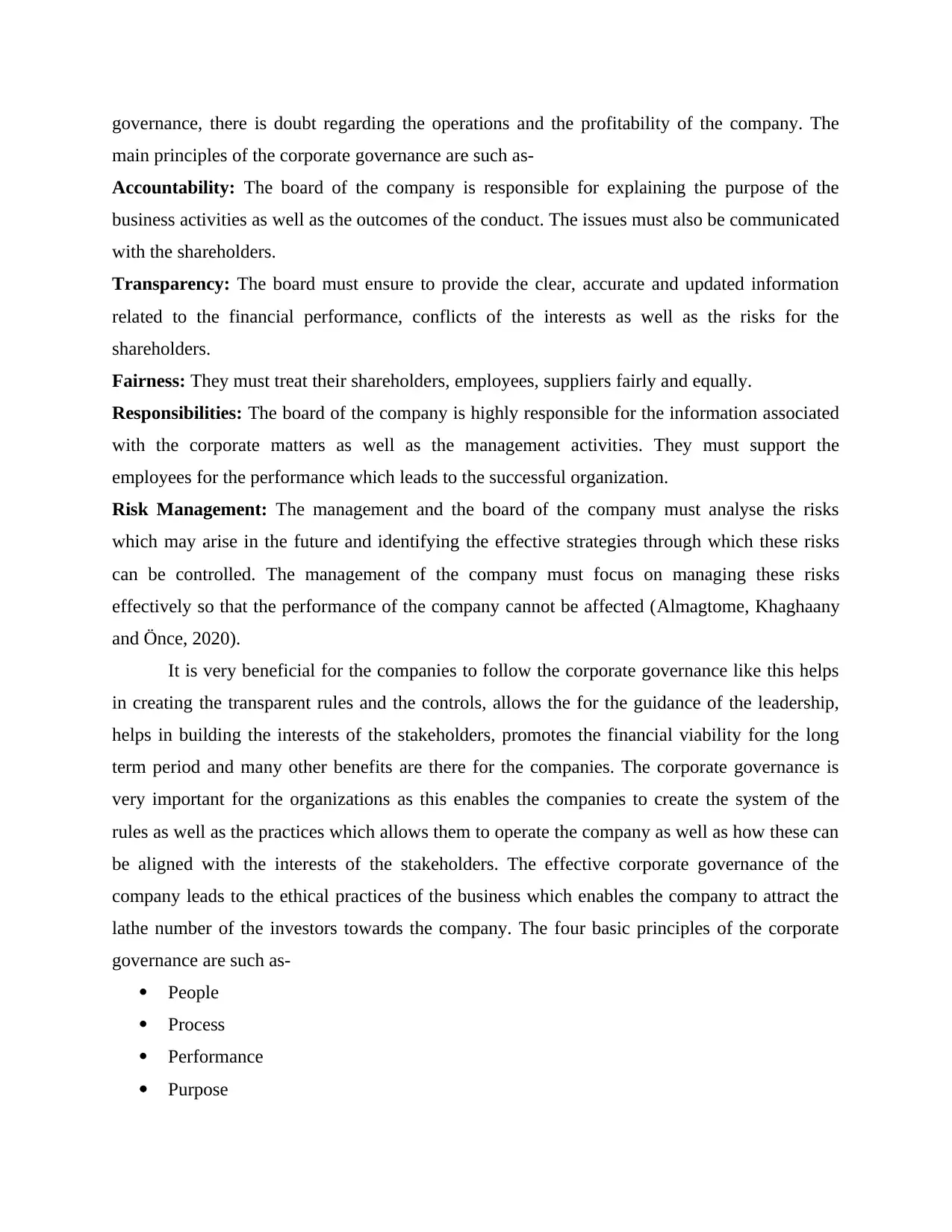
governance, there is doubt regarding the operations and the profitability of the company. The
main principles of the corporate governance are such as-
Accountability: The board of the company is responsible for explaining the purpose of the
business activities as well as the outcomes of the conduct. The issues must also be communicated
with the shareholders.
Transparency: The board must ensure to provide the clear, accurate and updated information
related to the financial performance, conflicts of the interests as well as the risks for the
shareholders.
Fairness: They must treat their shareholders, employees, suppliers fairly and equally.
Responsibilities: The board of the company is highly responsible for the information associated
with the corporate matters as well as the management activities. They must support the
employees for the performance which leads to the successful organization.
Risk Management: The management and the board of the company must analyse the risks
which may arise in the future and identifying the effective strategies through which these risks
can be controlled. The management of the company must focus on managing these risks
effectively so that the performance of the company cannot be affected (Almagtome, Khaghaany
and Önce, 2020).
It is very beneficial for the companies to follow the corporate governance like this helps
in creating the transparent rules and the controls, allows the for the guidance of the leadership,
helps in building the interests of the stakeholders, promotes the financial viability for the long
term period and many other benefits are there for the companies. The corporate governance is
very important for the organizations as this enables the companies to create the system of the
rules as well as the practices which allows them to operate the company as well as how these can
be aligned with the interests of the stakeholders. The effective corporate governance of the
company leads to the ethical practices of the business which enables the company to attract the
lathe number of the investors towards the company. The four basic principles of the corporate
governance are such as-
People
Process
Performance
Purpose
main principles of the corporate governance are such as-
Accountability: The board of the company is responsible for explaining the purpose of the
business activities as well as the outcomes of the conduct. The issues must also be communicated
with the shareholders.
Transparency: The board must ensure to provide the clear, accurate and updated information
related to the financial performance, conflicts of the interests as well as the risks for the
shareholders.
Fairness: They must treat their shareholders, employees, suppliers fairly and equally.
Responsibilities: The board of the company is highly responsible for the information associated
with the corporate matters as well as the management activities. They must support the
employees for the performance which leads to the successful organization.
Risk Management: The management and the board of the company must analyse the risks
which may arise in the future and identifying the effective strategies through which these risks
can be controlled. The management of the company must focus on managing these risks
effectively so that the performance of the company cannot be affected (Almagtome, Khaghaany
and Önce, 2020).
It is very beneficial for the companies to follow the corporate governance like this helps
in creating the transparent rules and the controls, allows the for the guidance of the leadership,
helps in building the interests of the stakeholders, promotes the financial viability for the long
term period and many other benefits are there for the companies. The corporate governance is
very important for the organizations as this enables the companies to create the system of the
rules as well as the practices which allows them to operate the company as well as how these can
be aligned with the interests of the stakeholders. The effective corporate governance of the
company leads to the ethical practices of the business which enables the company to attract the
lathe number of the investors towards the company. The four basic principles of the corporate
governance are such as-
People
Process
Performance
Purpose
Paraphrase This Document
Need a fresh take? Get an instant paraphrase of this document with our AI Paraphraser
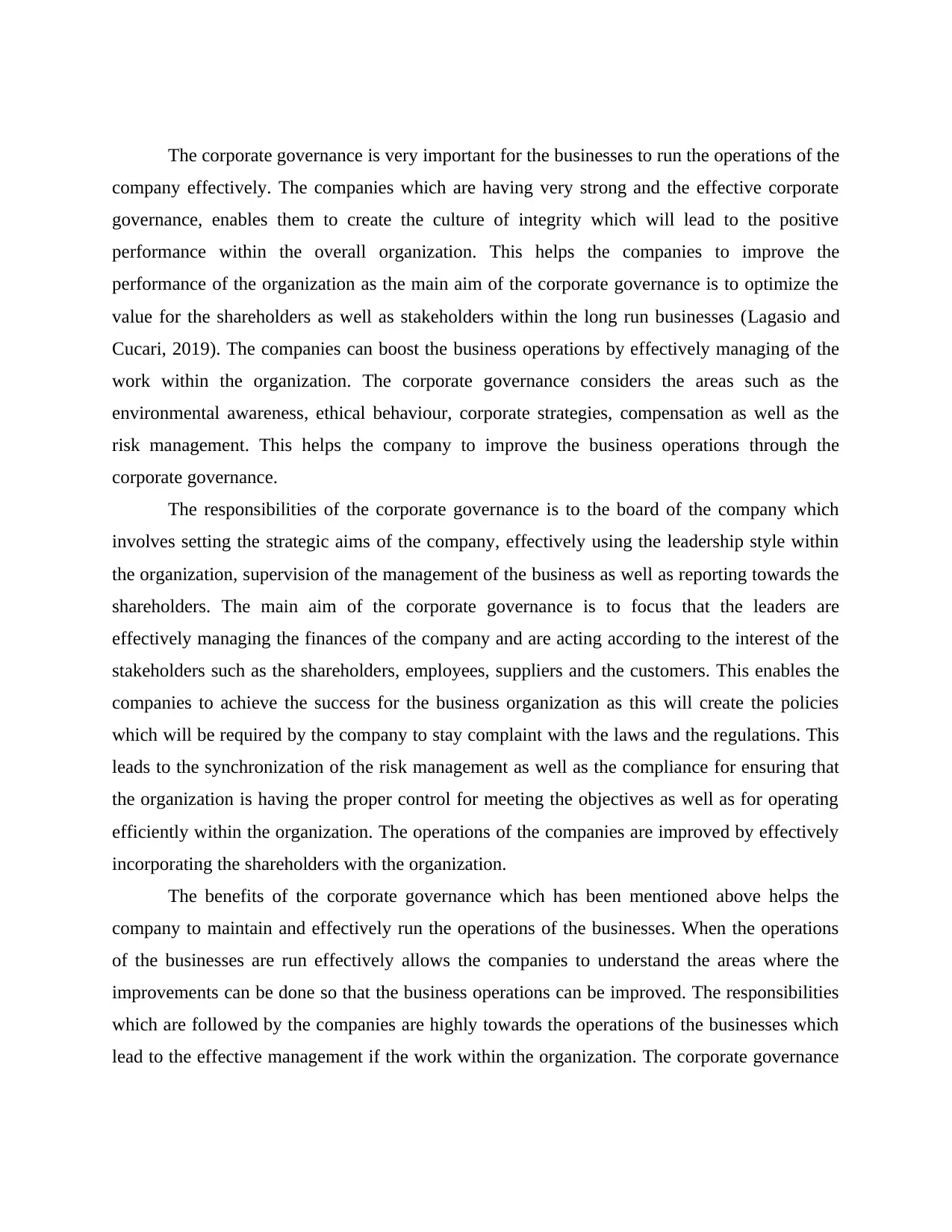
The corporate governance is very important for the businesses to run the operations of the
company effectively. The companies which are having very strong and the effective corporate
governance, enables them to create the culture of integrity which will lead to the positive
performance within the overall organization. This helps the companies to improve the
performance of the organization as the main aim of the corporate governance is to optimize the
value for the shareholders as well as stakeholders within the long run businesses (Lagasio and
Cucari, 2019). The companies can boost the business operations by effectively managing of the
work within the organization. The corporate governance considers the areas such as the
environmental awareness, ethical behaviour, corporate strategies, compensation as well as the
risk management. This helps the company to improve the business operations through the
corporate governance.
The responsibilities of the corporate governance is to the board of the company which
involves setting the strategic aims of the company, effectively using the leadership style within
the organization, supervision of the management of the business as well as reporting towards the
shareholders. The main aim of the corporate governance is to focus that the leaders are
effectively managing the finances of the company and are acting according to the interest of the
stakeholders such as the shareholders, employees, suppliers and the customers. This enables the
companies to achieve the success for the business organization as this will create the policies
which will be required by the company to stay complaint with the laws and the regulations. This
leads to the synchronization of the risk management as well as the compliance for ensuring that
the organization is having the proper control for meeting the objectives as well as for operating
efficiently within the organization. The operations of the companies are improved by effectively
incorporating the shareholders with the organization.
The benefits of the corporate governance which has been mentioned above helps the
company to maintain and effectively run the operations of the businesses. When the operations
of the businesses are run effectively allows the companies to understand the areas where the
improvements can be done so that the business operations can be improved. The responsibilities
which are followed by the companies are highly towards the operations of the businesses which
lead to the effective management if the work within the organization. The corporate governance
company effectively. The companies which are having very strong and the effective corporate
governance, enables them to create the culture of integrity which will lead to the positive
performance within the overall organization. This helps the companies to improve the
performance of the organization as the main aim of the corporate governance is to optimize the
value for the shareholders as well as stakeholders within the long run businesses (Lagasio and
Cucari, 2019). The companies can boost the business operations by effectively managing of the
work within the organization. The corporate governance considers the areas such as the
environmental awareness, ethical behaviour, corporate strategies, compensation as well as the
risk management. This helps the company to improve the business operations through the
corporate governance.
The responsibilities of the corporate governance is to the board of the company which
involves setting the strategic aims of the company, effectively using the leadership style within
the organization, supervision of the management of the business as well as reporting towards the
shareholders. The main aim of the corporate governance is to focus that the leaders are
effectively managing the finances of the company and are acting according to the interest of the
stakeholders such as the shareholders, employees, suppliers and the customers. This enables the
companies to achieve the success for the business organization as this will create the policies
which will be required by the company to stay complaint with the laws and the regulations. This
leads to the synchronization of the risk management as well as the compliance for ensuring that
the organization is having the proper control for meeting the objectives as well as for operating
efficiently within the organization. The operations of the companies are improved by effectively
incorporating the shareholders with the organization.
The benefits of the corporate governance which has been mentioned above helps the
company to maintain and effectively run the operations of the businesses. When the operations
of the businesses are run effectively allows the companies to understand the areas where the
improvements can be done so that the business operations can be improved. The responsibilities
which are followed by the companies are highly towards the operations of the businesses which
lead to the effective management if the work within the organization. The corporate governance
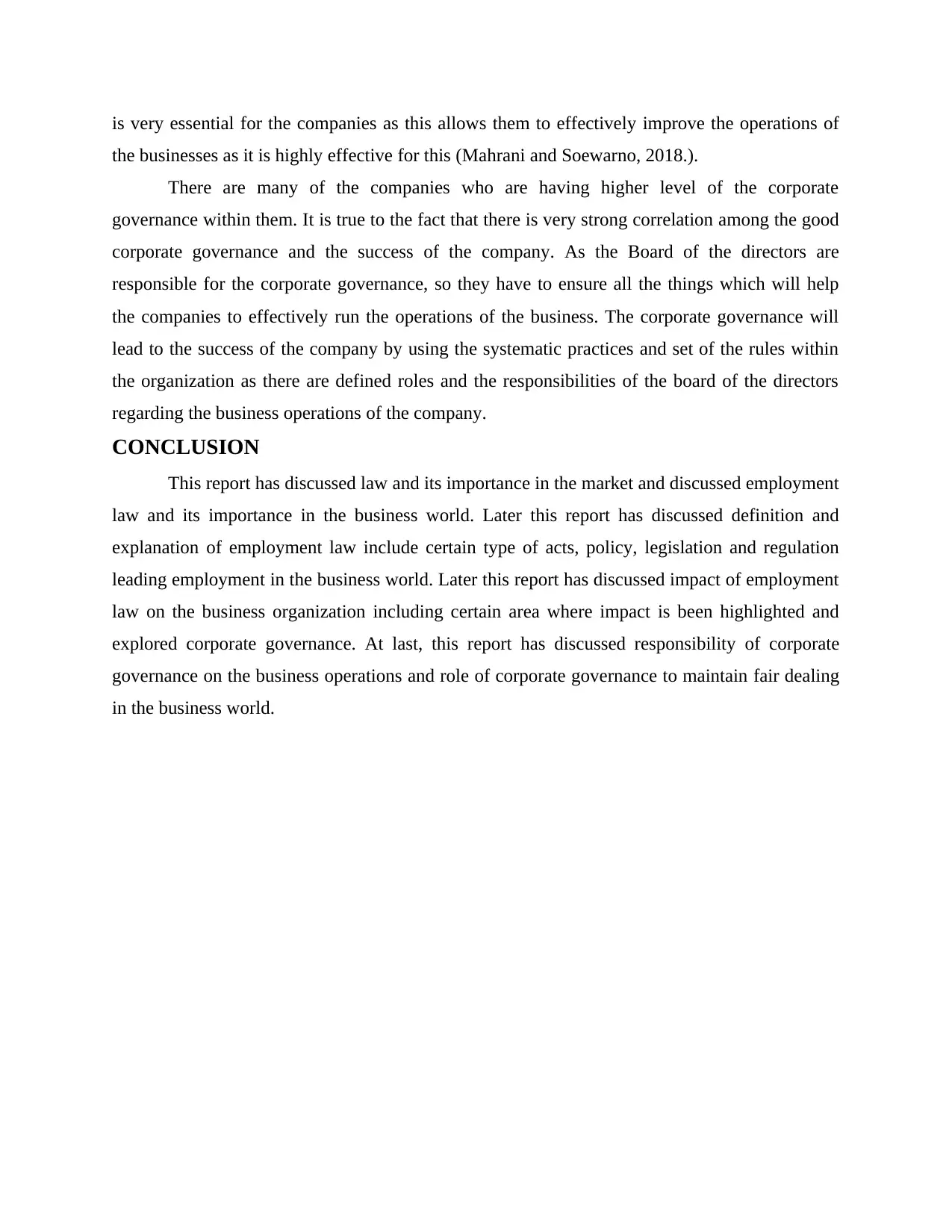
is very essential for the companies as this allows them to effectively improve the operations of
the businesses as it is highly effective for this (Mahrani and Soewarno, 2018.).
There are many of the companies who are having higher level of the corporate
governance within them. It is true to the fact that there is very strong correlation among the good
corporate governance and the success of the company. As the Board of the directors are
responsible for the corporate governance, so they have to ensure all the things which will help
the companies to effectively run the operations of the business. The corporate governance will
lead to the success of the company by using the systematic practices and set of the rules within
the organization as there are defined roles and the responsibilities of the board of the directors
regarding the business operations of the company.
CONCLUSION
This report has discussed law and its importance in the market and discussed employment
law and its importance in the business world. Later this report has discussed definition and
explanation of employment law include certain type of acts, policy, legislation and regulation
leading employment in the business world. Later this report has discussed impact of employment
law on the business organization including certain area where impact is been highlighted and
explored corporate governance. At last, this report has discussed responsibility of corporate
governance on the business operations and role of corporate governance to maintain fair dealing
in the business world.
the businesses as it is highly effective for this (Mahrani and Soewarno, 2018.).
There are many of the companies who are having higher level of the corporate
governance within them. It is true to the fact that there is very strong correlation among the good
corporate governance and the success of the company. As the Board of the directors are
responsible for the corporate governance, so they have to ensure all the things which will help
the companies to effectively run the operations of the business. The corporate governance will
lead to the success of the company by using the systematic practices and set of the rules within
the organization as there are defined roles and the responsibilities of the board of the directors
regarding the business operations of the company.
CONCLUSION
This report has discussed law and its importance in the market and discussed employment
law and its importance in the business world. Later this report has discussed definition and
explanation of employment law include certain type of acts, policy, legislation and regulation
leading employment in the business world. Later this report has discussed impact of employment
law on the business organization including certain area where impact is been highlighted and
explored corporate governance. At last, this report has discussed responsibility of corporate
governance on the business operations and role of corporate governance to maintain fair dealing
in the business world.
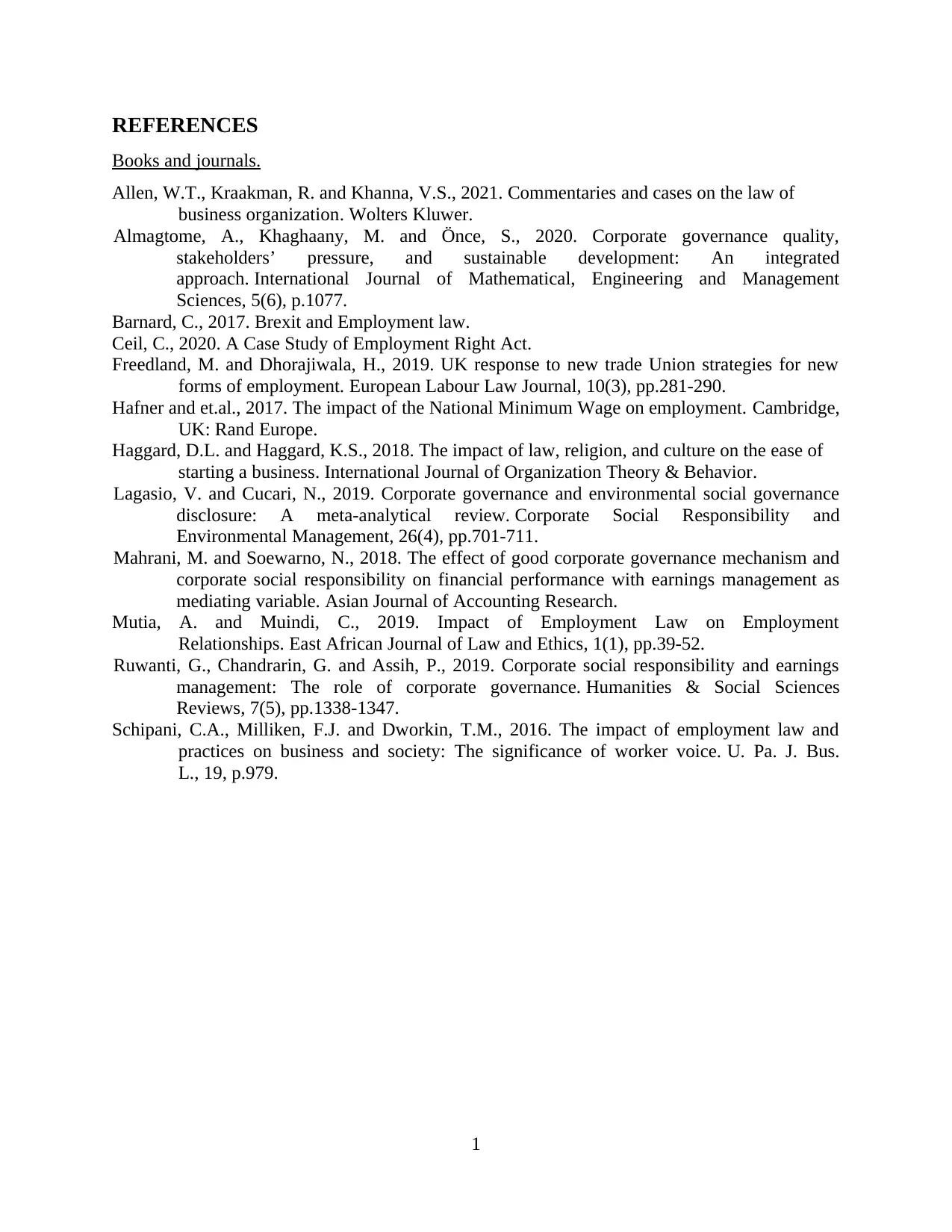
REFERENCES
Books and journals.
Allen, W.T., Kraakman, R. and Khanna, V.S., 2021. Commentaries and cases on the law of
business organization. Wolters Kluwer.
Almagtome, A., Khaghaany, M. and Önce, S., 2020. Corporate governance quality,
stakeholders’ pressure, and sustainable development: An integrated
approach. International Journal of Mathematical, Engineering and Management
Sciences, 5(6), p.1077.
Barnard, C., 2017. Brexit and Employment law.
Ceil, C., 2020. A Case Study of Employment Right Act.
Freedland, M. and Dhorajiwala, H., 2019. UK response to new trade Union strategies for new
forms of employment. European Labour Law Journal, 10(3), pp.281-290.
Hafner and et.al., 2017. The impact of the National Minimum Wage on employment. Cambridge,
UK: Rand Europe.
Haggard, D.L. and Haggard, K.S., 2018. The impact of law, religion, and culture on the ease of
starting a business. International Journal of Organization Theory & Behavior.
Lagasio, V. and Cucari, N., 2019. Corporate governance and environmental social governance
disclosure: A meta‐analytical review. Corporate Social Responsibility and
Environmental Management, 26(4), pp.701-711.
Mahrani, M. and Soewarno, N., 2018. The effect of good corporate governance mechanism and
corporate social responsibility on financial performance with earnings management as
mediating variable. Asian Journal of Accounting Research.
Mutia, A. and Muindi, C., 2019. Impact of Employment Law on Employment
Relationships. East African Journal of Law and Ethics, 1(1), pp.39-52.
Ruwanti, G., Chandrarin, G. and Assih, P., 2019. Corporate social responsibility and earnings
management: The role of corporate governance. Humanities & Social Sciences
Reviews, 7(5), pp.1338-1347.
Schipani, C.A., Milliken, F.J. and Dworkin, T.M., 2016. The impact of employment law and
practices on business and society: The significance of worker voice. U. Pa. J. Bus.
L., 19, p.979.
1
Books and journals.
Allen, W.T., Kraakman, R. and Khanna, V.S., 2021. Commentaries and cases on the law of
business organization. Wolters Kluwer.
Almagtome, A., Khaghaany, M. and Önce, S., 2020. Corporate governance quality,
stakeholders’ pressure, and sustainable development: An integrated
approach. International Journal of Mathematical, Engineering and Management
Sciences, 5(6), p.1077.
Barnard, C., 2017. Brexit and Employment law.
Ceil, C., 2020. A Case Study of Employment Right Act.
Freedland, M. and Dhorajiwala, H., 2019. UK response to new trade Union strategies for new
forms of employment. European Labour Law Journal, 10(3), pp.281-290.
Hafner and et.al., 2017. The impact of the National Minimum Wage on employment. Cambridge,
UK: Rand Europe.
Haggard, D.L. and Haggard, K.S., 2018. The impact of law, religion, and culture on the ease of
starting a business. International Journal of Organization Theory & Behavior.
Lagasio, V. and Cucari, N., 2019. Corporate governance and environmental social governance
disclosure: A meta‐analytical review. Corporate Social Responsibility and
Environmental Management, 26(4), pp.701-711.
Mahrani, M. and Soewarno, N., 2018. The effect of good corporate governance mechanism and
corporate social responsibility on financial performance with earnings management as
mediating variable. Asian Journal of Accounting Research.
Mutia, A. and Muindi, C., 2019. Impact of Employment Law on Employment
Relationships. East African Journal of Law and Ethics, 1(1), pp.39-52.
Ruwanti, G., Chandrarin, G. and Assih, P., 2019. Corporate social responsibility and earnings
management: The role of corporate governance. Humanities & Social Sciences
Reviews, 7(5), pp.1338-1347.
Schipani, C.A., Milliken, F.J. and Dworkin, T.M., 2016. The impact of employment law and
practices on business and society: The significance of worker voice. U. Pa. J. Bus.
L., 19, p.979.
1
1 out of 10
Related Documents
Your All-in-One AI-Powered Toolkit for Academic Success.
+13062052269
info@desklib.com
Available 24*7 on WhatsApp / Email
![[object Object]](/_next/static/media/star-bottom.7253800d.svg)
Unlock your academic potential
© 2024 | Zucol Services PVT LTD | All rights reserved.



